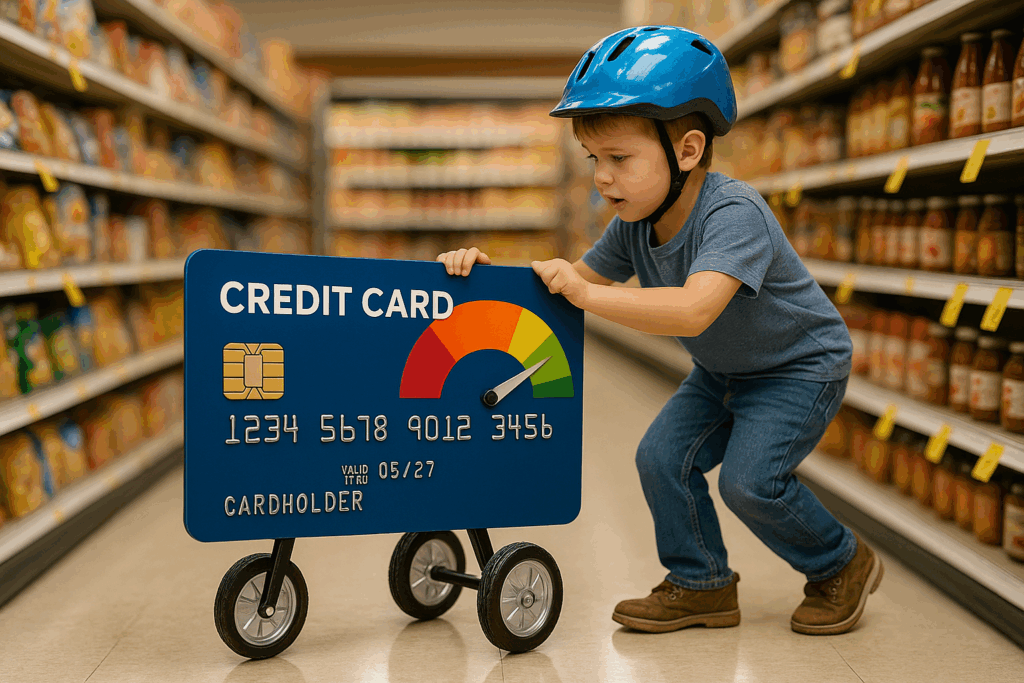Should My Child Get a Credit Card?

Getting your child a credit card can be an excellent way to teach financial responsibility and help them build credit early. Establishing good habits now can set them up for future success. But, should my child get a credit card? Let’s explore the pros, cons, and key considerations to help you make the right choice.

Can You Open a Credit Card for Your Child?
Children under 18 cannot open a credit card independently. However, you can make them an authorized user on your account. Many card issuers allow this as early as age 13.
As an authorized user, your child will have their own credit card linked to your account. While they can make purchases, you’re responsible for paying the bill. This setup gives you control while helping your child learn the basics of credit management.
Before adding them, confirm with your credit card issuer that their account activity will be reported to the three major credit bureaus—Experian, TransUnion, and Equifax. This ensures their credit history benefits from your good credit habits.
Pros and Cons of Getting a Credit Card for Your Child
Pros
- Builds Credit History
Adding your child as an authorized user helps them start building a positive credit history early. - Teaches Financial Responsibility
Your child can learn about budgeting, tracking expenses, and making payments, all while under your guidance. - Emergency Access
A credit card can be a lifeline in emergencies, such as unexpected school or travel expenses. - Earns Rewards
If you link them to a rewards card, their purchases can contribute to earning cash back, points, or miles.
Cons
- Overspending Risk
Children might view credit as free money. Setting clear spending limits is crucial to prevent misuse. - Parental Responsibility
As the primary cardholder, you’re liable for all charges, even those your child incurs. - Impact on Your Credit
If overspending leads to missed payments, your credit score could suffer. - Shared Credit Impact
Your credit mistakes—like high utilization or missed payments—could negatively affect your child’s credit as an authorized user.
What Are the Minimum Age Requirements?
Each credit card issuer has its own rules about adding authorized users. Some set the minimum age at 13, while others have no age limit. Check with your issuer to understand their policy.
How to Teach Your Child Good Credit Habits
Introducing your child to credit is a valuable opportunity to teach lifelong financial skills. Here’s how to guide them:
- Explain Credit Basics
Teach your child how credit cards work, including borrowing money, paying it back, and understanding interest rates. Compare credit cards to debit cards to highlight their differences. - Be a Role Model
Show responsible credit use. Let your child see how you make decisions, like choosing a card for specific purchases and paying off the balance on time. - Set Clear Rules
Decide what the card can be used for (e.g., school supplies, gas) and set spending limits. If your child has an allowance or job, discuss whether they’ll contribute to payments. - Monitor Spending Together
Review your monthly credit card statement with your child. Use this as a teaching moment to emphasize the importance of paying bills on time and in full. - Gradually Increase Responsibility
As your child demonstrates good habits, you can increase their spending limit or give them more independence.
Should My Child Get a Credit Card?
The answer depends on your child’s age, maturity, and understanding of financial concepts. For younger teens, becoming an authorized user on your card is often the best way to introduce them to credit. This allows them to build credit history under your supervision.
Protecting Your Child’s Identity
Encouraging good credit habits also includes safeguarding your child’s identity. Consider enrolling in a family identity protection plan to monitor for fraudulent activity. This adds an extra layer of security for your family’s financial future.
The Bottom Line
Should my child get a credit card? The decision hinges on their readiness to handle financial responsibility. Adding them as an authorized user can help them build credit and learn critical money management skills while you maintain control. With clear guidelines and ongoing discussions, this can be a stepping stone toward financial independence.
If you ever need expert assistance or guidance on your credit journey, don’t hesitate to reach out to the Nerds! Additionally, stay updated with the latest tips and information by following us on Facebook, Instagram and TikTok!

